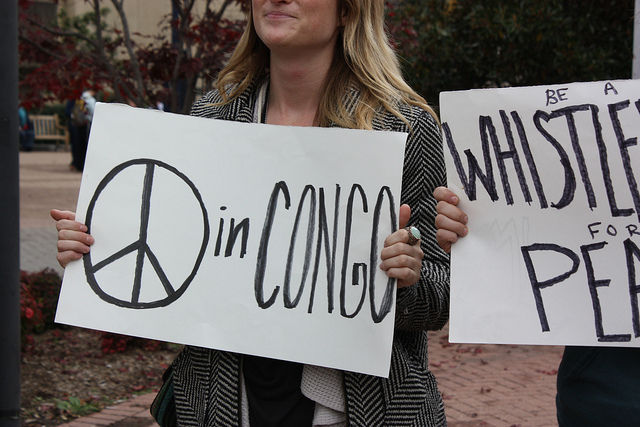
Tech giant Apple has come a long way on conflict minerals. In 2010, they were one of the worst consumer electronics companies in their response to this serious problem, and Enough Project, Campus Progress, and A Thousand Sisters protested the opening of their store in Georgetown, Washington, D.C. But Apple has started to turn the corner on conflict minerals with some substantial steps.
In their latest sustainability report, Apple announced that it had joined the Public Private Alliance on Responsible Minerals Trade, a joint effort of governments, corporations, and civil society to support Congo to develop a clean, conflict-free minerals trade. Enough is a governance committee member of the alliance, which is currently supporting a gold miners’ registration project and a minerals monitoring project.
Impressively, the company issued even clearer guidance to its suppliers on conflict minerals, saying “We’ll require our suppliers to move their sourcing of tin, tungsten, and gold to certified conflict-free sources as smelters become certified.” That is a huge step, and Apple should be saluted. Thirty-one smelters have passed the audits of the Conflict-Free Smelter program, but the trick to truly going conflict-free and getting smelters more on board (there are around 200 total) is to require suppliers to use only certified smelters. Apple was the first company to make that commitment, and more companies such as Boeing and others should now issues similar policies.
Apple also put a firm count on the number of smelters in its supply chain: 211 in total. That is a good step—the third year in a row the company has done so.
It is time for Apple to take the next step and begin a Congo sourcing program to purchase clean minerals from Congo. Motorola Solutions, Philips, and Kemet started programs over the past two years to do so, the Solutions for Hope Project, the Conflict-Free Tin Initiative, and the Making Africa Work program. These pilot initiatives are helpful, but it would send huge signals to the global minerals supply chain, if Apple started a similar project—to help communities directly in Congo and improve working conditions. The indicators from the current pilots are positive so far, including a tripling of the price paid for minerals for Congolese miners, and investments in health and infrastructure for communities.
We would also encourage Apple to publish the names of its smelters, as Philips and Sandisk have done.
Photo: Congo activists at a demonstration (Enough / Raise Hope for Congo)
Related Stories:

